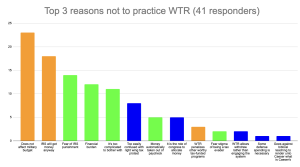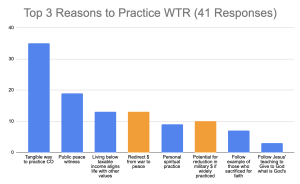By Tim Godshall
When I first learned of WTR in my teenage years, I was smitten. Growing up in the Mennonite church, in which pacifism is a key part of church doctrine, I learned about our history of conscientious objectors who refused to fight in previous wars. Since the U.S. military draft ended a few years before my birth, how would I practice my conscientious objection? War tax resistance, of course!

Church Peace Tax Fund Logo. Created by Jesse Graber
I’ve been a war tax resister for 23 years now – nearly half my life. The longer I’ve been involved, the more questions I have. One of those questions is why don’t more of my left-leaning Mennonite peers participate in WTR? I’ll address that question in a bit, but first, here’s a very brief summary of Anapbatist movement, which started exactly 500 years ago in Europe, out of which present-day Mennonites and numerous other denominations emerged:
The Anabaptist movement was a subset of the larger religious reformation that swept Europe in the 16th century. The Anabaptists rejected the practice of infant baptism and were thus named for their practice of re-baptizing each other as adults. While this doesn’t seem like such a big deal in today’s society, at that time, infant baptism was the bedrock of the church/state system. It was the official mechanism to create loyal subjects with the duty to pay taxes and fight wars. Anabaptists were severely persecuted for their actions, and many were killed for their refusal to participate in the system.
 Out of this history, WTR would seem to be a pretty obvious practice for modern day Mennonites. While I don’t have any stats on this, I would be fairly confident that among U.S. Mennonites, there is a much higher level of WTR than among the U.S. population in general. Still, it is a very small number of people. For instance, in the very progressive Mennonite church in which I am one of roughly 250 members, there are five households who at times have practiced WTR in recent years.
Out of this history, WTR would seem to be a pretty obvious practice for modern day Mennonites. While I don’t have any stats on this, I would be fairly confident that among U.S. Mennonites, there is a much higher level of WTR than among the U.S. population in general. Still, it is a very small number of people. For instance, in the very progressive Mennonite church in which I am one of roughly 250 members, there are five households who at times have practiced WTR in recent years.
So, to answer my question, I put a survey in my church newsletter and emailed it around to my left-leaning Mennonite friends in other places. I got 41 responses – 19 from those who have at some point practiced WTR (whether living below taxable income or refusing payment) and 22 from those who have never done WTR in any form. There is nothing scientifically rigorous about this, but here is how the responders to my survey listed their top 3 reasons to do WTR and their top 3 reasons NOT to do WTR.
I color coded the responses according to broader themes I saw – orange = effectiveness (or lack thereof), blue = principles, and green = personal consequences/fear. I was not surprised that lack of effectiveness was high on the list of reasons against WTR, and that principles were high on the list of reasons for WTR.
It was interesting to me to see that there were a number of reasons that left-leaning Mennonites would, on principle, oppose WTR. We are living in a very different time than the Anabaptists of 1525. We have a bill of rights and a representative democracy in which we have other levers of power. We also see the many positive things that our taxes fund, and we benefit greatly from many of these. And if we really dig deep into our thoughts, maybe we also take some comfort in knowing that we’ve got the world’s biggest military.
These questions challenge me and my idealism. On one hand I seek to engage these questions as valid challenges, and practice my WTR with humility. On the other, I must remember that even if my WTR isn’t changing the world, neither is it a meaningless act if it is done from a place of conscience. And maybe enough acts of conscience can eventually create some change.
On that note, one final thought: Mennonite Action, which sprung up in late 2023 to organize collective action for a ceasefire in Gaza, is polling its members to see if there is interest in organized mass WTR. If this conversation turns into action, I’m sure you’ll hear about it through NWTRCC.
[Editor’s Note: MennoCon 2025 taking place in Greensboro, North Carolina July 8-12 and will feature a session on War Tax Resistance. H. A. Penner and Jay Bergen have organized a session for the Mennonite Church USA convention titled, “War Tax Resistance as Public Witness.” The session will discuss the history of Mennonite war tax resistance with an eye toward organizing a national WTR effort to disrupt the US war machine. This session is currently slotted for Wednesday July 9th at 2:30pm. You can find information about the conference and how to register here. You can also find a sermon about WTR from a Mennonite perspective here. Tim Godshall and HA Penner and others with NWTRCC would love to know if you are planning to attend. Email outreach@nwtrcc.org and Chrissy will let others know. Also feel free to leave a note in the comments here.]



Why aren’t all churches encouraging their parishioners to refuse paying for war? Especially, the Christian churches who claim Christ is their leader who taught loving one’s enemies and doing good to those who harm you are not being faithful to the command of Christ and still maintain they are followers of Christ? This lack of being responsible to follow Christ means that these churches place more hope in the leaders of the country than they do for Christ. Why are we then surprised that there are always wars and rumors of wars?
Very interesting article. It would be great if the last graph could be enlarged, so I could read the reasons. It was too blurry on my screen even when I enlarged it. Thanks so much for these blogs!!!
Ginny,
Thanks for your comments! We made changes to post so that one can click on the graphs and see them more clearly. Thanks for your feedback and engagement.